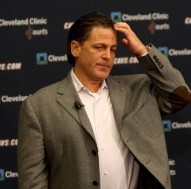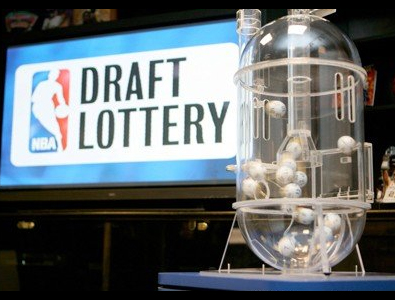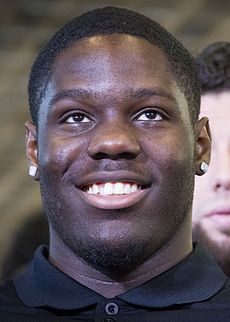 With the prospect of a dazzling draft class looming in 2014, the word “tanking” has been as much a part of the NBA lexicon as flopping or fouling.
With the prospect of a dazzling draft class looming in 2014, the word “tanking” has been as much a part of the NBA lexicon as flopping or fouling.
Teams with little to no hope of making the playoffs – let alone doing anything there if they did – should just pack it in now and wait for the lottery in May and the draft in June. That’s where the real bonanza lies this season.
Tanking has always been part of the NBA, which is why the lottery was instituted in the first place and subsequently tweaked along the way. But with so many teams going nowhere this season – like 13 of the 15 in the Eastern Conference – and with such an attractive mother lode awaiting, the temptation to lose now and win later has never been greater.
Which leads us to the Cleveland Cavaliers. They present a cautionary tale, not so much in the risks and rewards of tanking, but in the supposedly “get-rich-quick” scheme that the lottery presumably offers.
 No team in the NBA has had better luck in the lottery over the past three seasons than the Cavaliers. They had the No. 1 and No. 4 picks in 2011. They had the second-worst record in the league that season. They had the No. 4 pick in 2012. They had the No. 1 pick in 2013 (with the third-worst record). If you go back to LeBron James in 2003, the Cavs have had three No. 1 overall picks in the last 11 years. No other team has even had two in that span.
No team in the NBA has had better luck in the lottery over the past three seasons than the Cavaliers. They had the No. 1 and No. 4 picks in 2011. They had the second-worst record in the league that season. They had the No. 4 pick in 2012. They had the No. 1 pick in 2013 (with the third-worst record). If you go back to LeBron James in 2003, the Cavs have had three No. 1 overall picks in the last 11 years. No other team has even had two in that span.
So that’s four lottery picks in the last three drafts, none of them lower than fourth and two of them being No. 1 overall.
One of those picks, Kyrie Irving, has developed into an All-Star. The others? They’re still young, still growing and still learning, which may help explain why the Cavaliers left Boston on Saturday with a 10-19 record after a 103-100 loss, then dropped to .333 with a disheartening 108-104 home overtime loss to Golden State on Sunday night. Irving forced OT with a great crossover move to free himself for a tying 3-pointer at the end of regulation.
“They are great guys, focused guys, and they know how to play the game the right way and that’s what I’m focused on, just helping those guys win ballgames,” said Cavaliers coach Mike Brown, who hasn’t had much luck doing that.
That was before the game, when the team announced it had indefinitely suspended center Andrew Bynum for conduct detrimental to the team. He, too, was a lottery pick, though a ways back (No. 10 in 2005.)
Tristan Thompson, taken No. 4 overall in 2011, is a regular starter who hasn’t missed a game in the last two seasons. He averages almost 12 points a game.
Dion Waiters, No. 4 in 2012, is averaging 15.2 points a game.
 Then there’s Anthony Bennett, the No. 1 overall pick last season. To say his rookie season has been a disappointment would be to take understatement to a new low. He’s averaging 2.4 points on 29 percent shooting.
Then there’s Anthony Bennett, the No. 1 overall pick last season. To say his rookie season has been a disappointment would be to take understatement to a new low. He’s averaging 2.4 points on 29 percent shooting.
The caveats are everywhere with the winning-by-losing philosophy.
Even getting the No. 1 pick doesn’t necessarily translate into instant success, especially if you take the wrong player (Greg Oden) for all the right reasons.
John Wall went No. 1 overall in 2010 and has yet to cash a playoff check. Neither has Irving (2011) or Anthony Davis (2012.)
Andrea Bargnani went No. 1 overall in 2006 and has been in 11 playoff games, none since 2008.
It’s way too soon to make a definitive judgment on Bennett, but it’s hard to remember a recent top overall pick who had such a dismal start. (We’re excluding Oden and Blake Griffin, each of whom missed their entire first year due to injury.)
There’s also the NBA axiom that young teams do not win, which never seems to diminish the hope and optimism that the lottery brings.
The Cavaliers have nine players on their roster who are 23 or younger. (Bennett is 20.) They have only two players, Jarrett Jack and Anderson Varejao, who are 30 or older.
(Does that explain what is going on in New York or Brooklyn? No, it doesn’t.)
All of the recent NBA champions have succeeded with veterans and only one them – San Antonio – did so because it won the lottery (and was lucky enough to do so when David Robinson and Tim Duncan were available.)
The Celtics used the lottery in 2007 to trade for Ray Allen and then had enough enticing players (and an all-to-willing trade partner in former Celtic Kevin McHale) to get Kevin Garnett.
The 2011 Mavericks were stocked with veterans, from Jason Kidd to Dirk Nowitzki.
James didn’t win until he joined Miami, which not only had Dwyane Wade (who didn’t win until he was joined by Shaq and Gary Payton, among others) and Chris Bosh. They all had nine years in the league when the Heat finally won in 2012. But veterans helped them get there, and again in 2013, with Allen, Mike Miller and Shane Battier providing big lifts.
The Cavaliers look like they might well crash the lottery again in 2014. They might even get one of the top picks – again.
That may not quite qualify for the Derrick Coleman treatment – ‘’whoop de damn do’’ – but a more standard adage from throughout the ages should apply: Be careful what you wish for.
Peter May is the only writer who covered the final NBA games played by Larry Bird, Magic Johnson and Michael Jordan. He has covered the league for three decades for The Hartford Courant and The Boston Globe and has written three books on the Boston Celtics. His work also appears in The New York Times. You can follow him on Twitter.